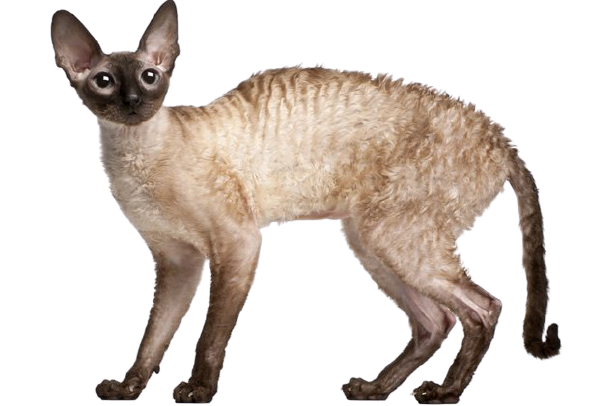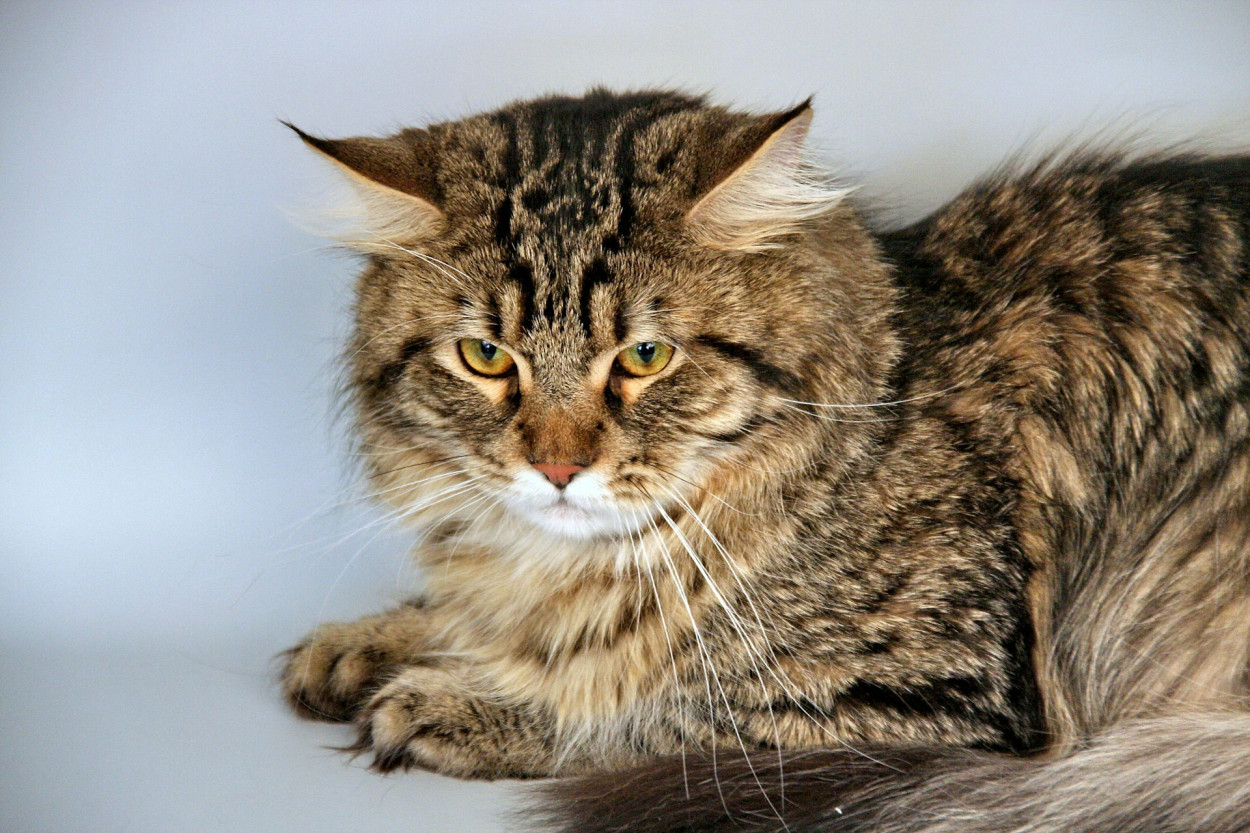
Cornish Rex
USD $800 - $1200 Price Avg.
Smallest, Small
Size
Yes
Lap Cat
11 to 14 years
Lifespan
Breed Information
| Popularity/Rank | 14 |
|---|---|
| Name | Cornish Rex |
| Other names | None |
| Origin | United Kingdom |
| Size | Smallest, Small |
| Coat | Curly, Extremely soft, Silky, Short Hair |
| Lap Cat | Yes |
| Lifespan | 11 to 14 years |
| Temperament |
Active, Curious, Intelligent, Playful, Affectionate Active: The Cornish Rex is an active cat that loves to play and explore. They are curious by nature and love to investigate their surroundings. They are also intelligent and can be trained to do tricks or play fetch. Cornish Rexes are very affectionate with their family and love to be around people. |
| Weight | Female: 6 - 8 pounds, Male: 8 - 10 pounds |
| Colors | Black, Blue, Chocolate, Cream, Lavender, Red, Silver, White |
| Kitten Prices |
USD $800 - $1200
When it comes to finding the perfect Cornish Rex kitten, there are a few things you need to take into consideration. The first is the price, which can range anywhere from $800 to $1,200 depending on the breeder and the kitten’s reputation. Next, you need to think about how the price will affect the quality of the kitten. And finally, you need to decide if a Cornish Rex is right for you and your family. Let’s start with price. As we mentioned before, Cornish Rex kittens can cost anywhere from $800 to $1,200. But what factors into this price range? Well, it really depends on the breeder and their reputation. If you go with a well-known breeder who has a good reputation, then you can expect to pay closer to $1,200. However, if you go with a less reputable breeder, then you might be able to get away with paying only $800. Now that we’ve covered price, let’s talk about how it affects quality. Generally speaking, the higher the price tag on a Cornish Rex kitten, the better the quality of the kitten will be. This is because reputable breeders only sell high-quality kittens, so they can charge more for them. On the other hand, less reputable breeders might sell lower-quality kittens for cheaper prices. So if you’re looking for a top-notch Cornish Rex kitten, be prepared to pay top dollar. Finally, let’s discuss whether or not a Cornish Rex is right for you and your family. If you have other pets in your home (such as dogs or cats), then a Cornish Rex might not be ideal since they tend to do better as solo pets. Additionally, if anyone in your household has allergies , then a Cornish Rex might not be the best choice since they do shed quite a bit . However , if neither of these things are an issue for you , then a Cornish Rex could make a great addition to your family ! |
Breed Characteristics
| Adaptability | |
|---|---|
| Affection Level | |
| Child Friendly | |
| Dog Friendly | |
| Energy Level | |
| Grooming | |
| Health Issues |
Hair loss, skin problems, allergies, respiratory problems, heart disease, kidney disease, cancer Is Cornish Rex cat Hypoallergenic? There is no definitive answer to this question as everyone's allergies are different. However, many people who are allergic to cats find that they can tolerate the Cornish Rex cat breed. This is because the Cornish Rex has very little fur, which means there is less dander (a common allergen) for people to react to. If you are considering getting a Cornish Rex, it is always best to spend some time around the breed first to see if you have any reaction. 1. Hair Loss The Cornish Rex is a hairless cat breed, which means they are prone to hair loss. While they do have some hair on their bodies, it is very fine and sparse. This can lead to bald spots and hairless patches, which can be a cause for concern for some owners. 2. Skin Problems Since the Cornish Rex is hairless, they are also prone to skin problems. Their skin is very sensitive and can be easily irritated. They are also susceptible to sunburn and skin cancer. 3. Allergies Cornish Rex cats can be allergic to a variety of things, including pollen, dust, and certain foods. This can lead to sneezing, watery eyes, and itchiness. 4. Respiratory Problems Hairless cats like the Cornish Rex are prone to respiratory problems. Their airways can be easily blocked by dust and other particles, which can lead to difficulty breathing. 5. Heart Disease Cornish Rex cats are also at risk for heart disease. This is due to their small size and lack of hair, which can make it difficult for their hearts to pump blood properly. 6. Kidney Disease Kidney disease is another health concern for Cornish Rex cats. This is because their kidneys are small and can be easily damaged. 7. Cancer Cancer is a serious health concern for all cats, but Cornish Rex cats are especially at risk. This is because their bodies are not able to fight off cancer cells as effectively as other cats. |
| Intelligence | |
| Shedding | |
| Social Needs | |
| Stranger Friendly | |
| Vocalization | |
| Health Care |
The Cornish Rex is a relatively healthy breed of cat, but like all cats, they are susceptible to certain health problems. Some of the health problems that have been reported in Cornish Rex cats include respiratory problems, heart defects, and kidney disease.
The best way to keep your Cornish Rex healthy is to take them to the vet for regular check-ups and to keep them up to date on their vaccinations. It is also important to feed them a high-quality diet and to keep them well-hydrated. |
History
The Cornish Rex is a breed of domestic cat that originated in Cornwall, England. The breed is characterized by its slender body, long legs, and large ears. The Cornish Rex is a relatively new breed, having been developed in the 1950s.
The Cornish Rex was developed from a naturally occurring mutation that occurred in a litter of kittens born in Cornwall, England in 1950. The kittens all had short, curly coats and long legs. One of the kittens, named Kallibunker, was sent to America where he became the founding father of the American Cornish Rex breed.
The Cornish Rex nearly became extinct in the 1970s due to a lack of interest from breeders. However, a few dedicated breeders kept the breed alive and it has since become popular again. The Cornish Rex is now recognized by major cat registries such as the Cat Fanciers Association (CFA) and The International Cat Association (TICA).
The ancestry of the Cornish Rex is somewhat mysterious as there are no records of any other cats with similar physical characteristics prior to the appearance of Kallibunker and his littermates in 1950. It is believed that the mutation that resulted in the short, curly coats and long legs was a spontaneous genetic mutation that occurred in this one litter of kittens.
While the exact origins of the Cornish Rex are unknown, this unique and special breed of cat is now beloved by cat lovers around the world!
Description
The Cornish Rex is a unique looking cat that is sure to turn heads. With its slender body, large ears, and short, wavy fur, the Cornish Rex is a one-of-a-kind feline. But this cat is more than just a pretty face; it also has a friendly and loving personality that makes it a great companion. Here are some things to know about the Cornish Rex:
Appearance: The Cornish Rex has a slender body with long legs and large ears. Its most distinguishing feature is its short, wavy fur which can be found in a variety of colors including black, white, blue, cream, red, and silver.
Lifespan: The average lifespan of a Cornish Rex is 9-12 years.
Size: The Cornish Rex is a medium sized cat weighing 6-10 pounds.
Colors: As mentioned before, the Cornish Rex can come in a variety of colors including black, white, blue, cream, red, and silver.
Personality: The Cornish Rex is an affectionate and loving cat that enjoys being around people. It is also very playful and active making it an ideal pet for families with children or other pets. Additionally, the Cornish Rex is known for being intelligent and curious which means it will need plenty of toys and stimulation to stay happy and healthy.
Friendliness: The Cornish Rex gets along well with other cats, dogs, children, and other animals making it an adaptable pet. However, because of its high energy level it may do best in homes where it is the only pet so that it can have all the attention to itself.
Temperament: TheCornish Rex has a gentle temperament making it an ideal pet for families with children or other pets. Additionally, because of its high energy level the Cornish Rex will need plenty of toys and stimulation to stay happy and healthy.




